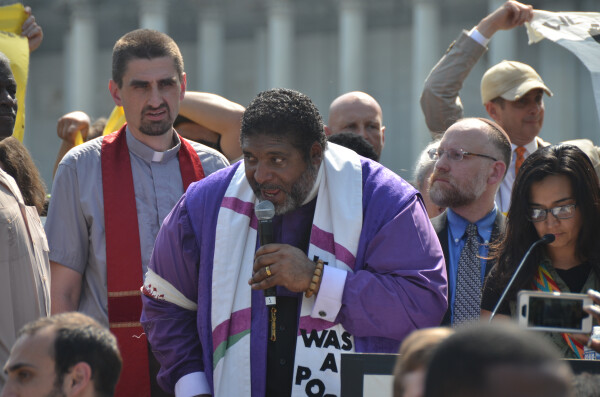United Methodist Women Leaders Join Poor People’s Campaign in D.C.
Symbolic arrests bring further attention to the plight of the poor.
United Methodist Women's Carol Barton at the Poor
People's Campaign in Washington D.C on May 14.
Fifty years ago, the Rev. Martin Luther King Jr. and the Southern Christian Leadership Conference organized the first Poor People’s Campaign. Its goal was to take the conversation on economic injustices and its ties to racism to Washington, D.C. King was assassinated in April 1968 before the march happened in June, but the Campaign continued its call for racial and economic justice under the leadership of Ralph Abernathy.
A new Poor People’s Campaign is being launched, this time under the co-leadership of the Rev. William Barber, pastor of Greenleaf Christian Church in Goldsboro, North Carolina, and the Rev. Liz Theoharis, co-director of the Kairos Center for Religions, Rights, and Social Justice at Union Theological Seminary in New York.
The new Campaign, Barber said, is intended to create networks of people willing to stand up to current government policies and demand change.
Two leaders from United Methodist Women joined with that network May 14 in front of the U.S. Capitol, at a rally that drew hundreds of people. Carol Barton, Executive for Community Action for United Methodist Women, was at the rally because she sensed this was a poignant moment in history.
“I feel this is
The Campaign, she said, connects very closely with the concerns and priorities of United Methodist Women, which include climate justice, ending criminalization in communities of color and mass incarceration, ending economic inequality, and
“We see in the Campaign a moment to help move forward the agenda we have as United Methodist Women,” Barton said.
Barton and Emily Jones, Executive for Racial Justice for United Methodist Women in the National Office, were arrested after the rally as part of a planned, non-violent action of blocking a street.
“I believe we have an under-reported crisis,” said Jones before the rally. “When we look at what’s happening to folks living in poverty across our country, especially women, children
Barton and Jones said that even if people are not able to join in the protests in person, either in D.C. or in their own state, being locally active can make a significant difference.
“We need folks in every community across the country who are engaging this from a Gospel-grounded place,” Jones said, “because we both can make
Both Jones and Barton felt passionate enough about the issues of poverty that they were arrested, along with about 100 other people, for blocking First Street in front of the Library of Congress. The symbolic action was designed to bring further attention to the plight of the poor.
“I feel that we as Christians and as the church are what we say we are;
Jones said that this wasn’t the first time she had been arrested for demonstrating for a
“You don’t willingly break laws often,” Jones said. “What keeps coming to my heart in prayer is Jesus turning the tables of the money changers because there’s a desecration happening. We’re shipping our children into prisons and not providing them the support they need in public schools. (There’s) a normalized crisis of racism and classism, economic inequality and ecological devastation, and it feels important to shine a moral light on that.”
Other United Methodist partners with United Methodist Women on the Poor People’s Campaign include the General Board of Church and
Speaking under a hot May sun, Barber addressed the issues of the campaign head-on.

The Rev. William Barber speaks to the crowd in front of the U.S. Capitol.
Photo by Erik Alsgaard.
“Every piece of policy that comes out of the Congress, that comes out of our state legislatures, should ensure domestic tranquility,” Barber said, referencing the preamble to the United States Constitution. “(It) should establish justice, provide for the common defense, and should promote the general welfare. We know, when we look at those principles, something’s wrong in America.”
Noting that Scripture contains more than 2,000 verses on what a moral agenda should look like, Barber quoted from Isaiah 10: “Woe unto those who legislate evil and rob the poor of their rights.”
The Poor People’s Campaign includes a long list of grievances and demands. Their website lists no fewer than 35 demands, ranging from environmental concerns to the prison industrial complex.
The Campaign estimates that there are 140 million poor people living in the United States today. That number is significantly higher than other reports because the Campaign uses a different method to calculate poverty. In fact, the Campaign challenges the government to do better in calculating the number.
According to the Campaign, the Official Poverty Measure in 2016 stood at 12.7 percent of the U.S. population – or 40.6 million people. Nearly 30 percent – or 95 million people – were low income, which is defined as living at less than twice the poverty line.
The Campaign draws its 140 million number from the Supplemental Poverty Measure, which considers income as well as the costs of food, clothing, housing and utilities, and government programs that have assisted low-income families and individuals who are not otherwise designated as poor.
“When you look at the plight of poor women, and poor children, and poor disabled people, we are falling short of the moral demands of the Constitution and the moral convictions of our deepest religious values,” Barber said.
The Poor People’s Campaign, Barber said, re-starts with six weeks of action with three goals: 1) to launch the movement and break through the prevailing narrative; 2) voter mobilization and registration among the poor
